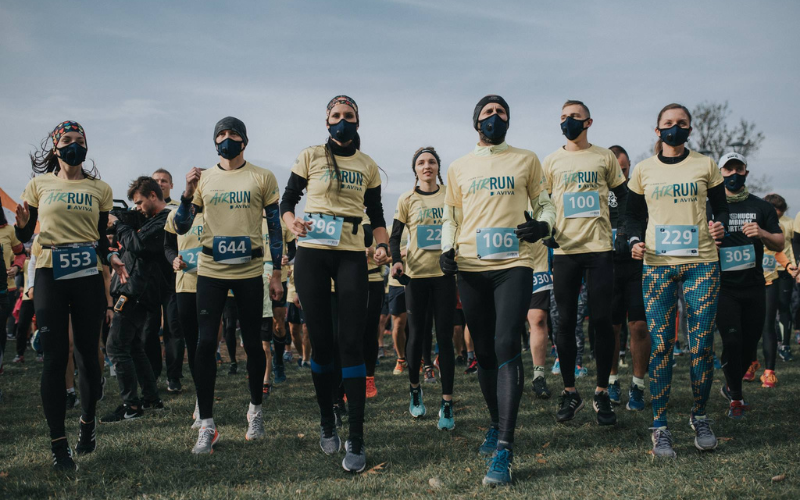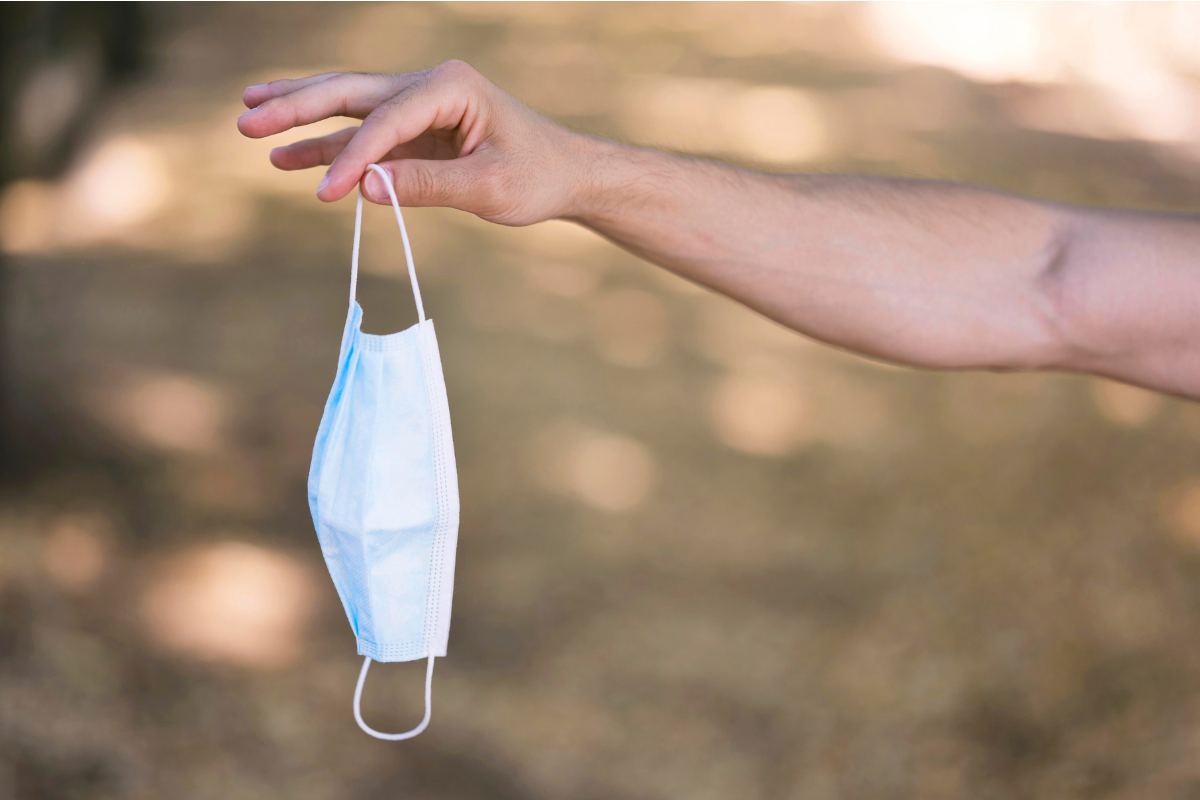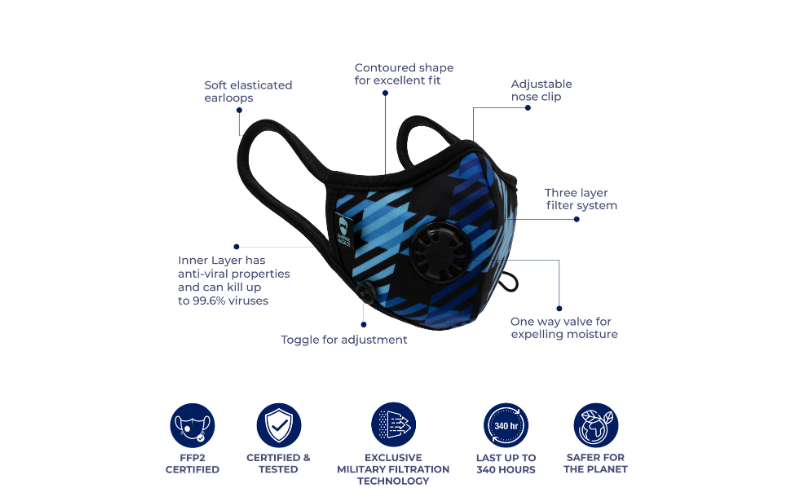
The Ultimate Guide to Running with a Face Mask: Tips for Beginners to Professionals
Running with a face mask might seem daunting initially, but it can be a comfortable and safe experience with the right tips and gear. Whether you're a beginner or a seasoned professional, this guide will give you everything you need to know about wearing a face mask while running. From understanding why runners wear masks to choosing the best one for your needs, we've got you covered.

Why Do Runners Wear Face Masks When Running?
Runners wear face masks for several reasons, each with its own benefits and considerations:
Health and Safety
Face masks help reduce the spread of respiratory droplets, protecting both the runner and those around them. This is particularly important in crowded areas or during pandemics. By wearing a face mask, runners contribute to the collective effort to minimize virus transmission. This is especially crucial when running in parks, on trails, or in other public spaces where maintaining physical distance might be challenging.
Air Quality
For those living in urban areas with high pollution levels, a running mask can filter out harmful particles, ensuring you breathe cleaner air. Air pollution is a significant concern for many runners, as inhaling pollutants can lead to respiratory issues and decreased lung function over time. A high-quality face mask can filter out particulate matter, such as PM2.5, and other pollutants, making your run healthier and more enjoyable.
Cold Weather Protection
In colder climates, a face mask can keep your face warm and protect your respiratory system from the harsh, cold air. Breathing in cold air can irritate the airways and cause discomfort, especially during long runs. A mask acts as a barrier, warming the air before it reaches your lungs and helping to maintain better respiratory health in cold weather.
Allergy Prevention
For runners with allergies, masks can help filter out pollen and other allergens, allowing for a more comfortable run. Spring and fall can be particularly challenging for those with seasonal allergies. Wearing a mask can reduce your exposure to pollen and other airborne allergens, making it easier to maintain your running routine without the added discomfort of allergy symptoms.
What to Look for in a Face Mask for Runners

When selecting a face mask for running, consider the following factors to ensure optimal performance and comfort:
Breathability
A mask that allows for easy breathing is crucial. Look for masks made from lightweight, moisture-wicking materials that can keep you comfortable during your run. Fabrics like polyester, nylon, and spandex blends are often used in running masks because they balance breathability and moisture management. Also, masks with mesh panels or other ventilation features can enhance airflow, making breathing easier during intense workouts.
Fit and Comfort
Ensure the mask fits snugly but comfortably against the sides of your face and under your chin. Adjustable ear loops or straps can help achieve a better fit. A well-fitted mask will stay in place during your run and minimize the need for adjustments, which can be distracting. Consider masks with a nose wire or flexible bridge to help secure the mask and prevent it from slipping.
Filtration Efficiency
If air quality or allergens are a concern, choose a mask with high filtration efficiency. Masks with multiple layers or specialized filters are ideal. Look for masks that can filter out particles as small as 0.3 microns to protect you from various pollutants and allergens. Some masks come with replaceable filters, which can be an added advantage for maintaining long-term filtration performance.
Durability
A reusable face mask that can withstand multiple washes and runs is more economical and environmentally friendly. Check the manufacturer's guidelines for care and maintenance to ensure the mask maintains its effectiveness after repeated use. High-quality masks are often made from durable materials that can handle the rigours of regular washing and intense workouts.
Valves: Should Your Mask Have One?
Masks with valves might seem appealing because they can make breathing easier by allowing air to escape more freely. However, they are not recommended in all situations. Valved masks might be suitable for solo runs in less populated areas, but it's essential to consider the potential impact on those around you.

Are Cambridge Mask Co's Face Masks Suitable for Runners?
Yes, Cambridge Mask Co’s face masks are an excellent choice for runners. Here's why:
Benefits of Cambridge Mask Co Face Masks
- High Filtration Efficiency: Cambridge Mask Co's masks are equipped with a military-grade filtration system that blocks out nearly 100% of particulate matter, including PM2.5, bacteria, and viruses. This high level of protection is particularly beneficial for runners concerned about air quality and exposure to airborne pathogens.
- Breathable and Comfortable: Designed with runners in mind, these masks are made from breathable materials that ensure comfort during long runs. The adjustable ear loops and nose bridge provide a secure fit without sacrificing comfort. The mask's design helps to minimize moisture buildup, keeping your face dry and reducing the risk of skin irritation.
- Reusable and Durable: These masks are built to last. They can be washed and reused multiple times, making them an environmentally friendly and cost-effective option. The materials used in Cambridge Mask Co’s products are selected for their durability and ability to maintain filtration efficiency even after multiple washes.
- Protection in Various Conditions: Whether you're running in polluted urban environments, during allergy season, or in cold weather, Cambridge Mask Co's masks provide the necessary protection to keep you safe and healthy. Their versatility makes them suitable for a wide range of running conditions, ensuring you can maintain your training routine year-round.
Conclusion
Running with a face mask doesn't have to be a hassle. By choosing the right mask and understanding its benefits, you can continue to enjoy your runs safely and comfortably. Cambridge Mask Co offers some of the best reusable face masks for runners, combining high filtration efficiency, comfort, and durability. Whether you're a beginner or a professional runner, investing in a quality face mask will help you breathe easy and stay protected.
Remember to consider factors like breathability, fit, filtration efficiency, and durability when selecting a mask. Valved masks might offer easier breathing but are not ideal for all situations. Cambridge Mask Co's masks provide excellent protection and comfort, making them a top choice for runners.
So lace up your running shoes, don your mask, and hit the pavement with confidence! Happy running!
By following these tips and choosing the right mask, you can ensure a safe and enjoyable running experience, regardless of the challenges posed by air quality, weather, or public health concerns. Stay informed, stay protected, and keep running strong.


